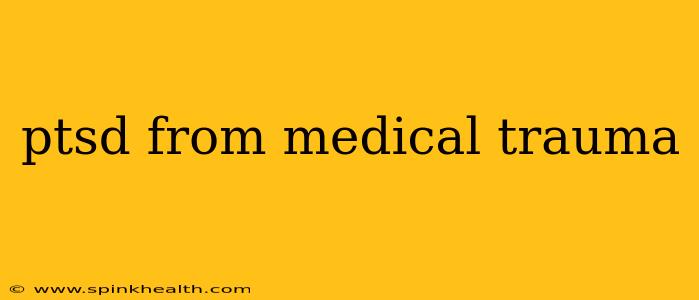The sterile scent of antiseptic, the rhythmic beep of heart monitors, the hushed whispers of medical professionals – for many, these are comforting sounds associated with healing. But for others, these same sounds and sights trigger a cascade of terrifying memories, the lingering effects of medical trauma that manifest as Post-Traumatic Stress Disorder (PTSD). This isn't just about a bad experience; it's about the profound impact medical procedures, diagnoses, or hospital stays can have on a person's mental health. This is a silent struggle, often overlooked and undertreated, deserving of understanding and compassion.
What is Medical Trauma?
Medical trauma encompasses a wide range of experiences that can leave a lasting negative impact. It's not limited to catastrophic events. It can stem from seemingly minor procedures, misdiagnoses, or even the overall experience of being a patient in a healthcare setting. Consider these examples:
- Surgical Procedures: The fear, pain, and vulnerability associated with surgery can be deeply distressing for some. The loss of control, the potential for complications, and the prolonged recovery can contribute to PTSD development.
- Diagnostic Procedures: Invasive procedures like biopsies or colonoscopies can be incredibly anxiety-inducing. The anticipation of pain, the uncertainty of results, and the potential for bad news can leave lasting emotional scars.
- Emergency Room Experiences: The chaos, uncertainty, and fear experienced in an emergency room can be particularly traumatic, especially if the outcome is negative. Witnessing serious injury or death can also have a devastating impact.
- Misdiagnosis or Medical Errors: The emotional consequences of a misdiagnosis, delayed treatment, or medical error can be immense. This often leads to feelings of betrayal, anger, and helplessness.
- Childbirth Trauma: For many, childbirth is a joyful experience. However, for others, it can be incredibly traumatic, involving complications, unexpected interventions, or perceived failures of the healthcare system.
The intensity of the experience is not always the sole determinant; individual vulnerability and coping mechanisms play a crucial role. Someone with pre-existing anxiety or a history of trauma may be more susceptible to developing PTSD following a medical event, even a relatively minor one.
How Does Medical Trauma Lead to PTSD?
PTSD isn't simply a response to a single event; it's a complex interplay of factors. The brain's stress response system is overwhelmed, leading to the development of intrusive thoughts, flashbacks, nightmares, and avoidance behaviors. In the context of medical trauma, these symptoms might manifest as:
- Intrusive Memories: Recurring vivid memories or flashbacks of the medical procedure or event.
- Nightmares: Distressing dreams related to the traumatic experience.
- Avoidance Behaviors: Avoiding places, situations, or activities that remind the person of the trauma, including doctor's appointments or hospitals.
- Negative Changes in Mood and Thinking: Feelings of detachment, numbness, guilt, or shame.
- Hyperarousal: Increased anxiety, irritability, difficulty sleeping, and exaggerated startle response.
How is PTSD from Medical Trauma Diagnosed?
Diagnosis of PTSD involves a comprehensive assessment by a mental health professional. This includes a detailed history of the traumatic event, evaluation of symptoms using standardized questionnaires, and ruling out other potential diagnoses. The professional will explore the impact on the person's daily life, relationships, and overall functioning.
What are the Treatment Options for PTSD from Medical Trauma?
Treatment options for PTSD from medical trauma are similar to those used for PTSD stemming from other traumatic events. They are multifaceted and may include:
- Psychotherapy: This is often the cornerstone of treatment. Trauma-focused therapies, such as Cognitive Processing Therapy (CPT) and Prolonged Exposure (PE), are particularly effective. They help individuals process their trauma and develop coping mechanisms.
- Medication: Medication, such as antidepressants and anti-anxiety medications, can help manage symptoms like depression, anxiety, and sleep disturbances.
- Support Groups: Connecting with others who have experienced similar traumas can provide valuable support and validation.
Can PTSD from Medical Trauma be Prevented?
While completely preventing medical trauma is impossible, there are steps healthcare providers can take to minimize the risk of PTSD development:
- Improving communication and patient education: Clearly explaining procedures, risks, and potential outcomes can reduce anxiety and improve the patient experience.
- Providing emotional support and empathy: Showing compassion and understanding can make a significant difference in a patient's emotional well-being.
- Creating a safe and comfortable environment: A supportive and respectful environment can ease anxiety and promote healing.
What if I think I have PTSD from Medical Trauma?
If you suspect you're experiencing PTSD from medical trauma, seek professional help. Don't hesitate to reach out to a therapist, counselor, or psychiatrist. Early intervention is key to effective treatment and recovery. Remember, you are not alone, and help is available. This condition is treatable, and recovery is possible. Your journey to healing deserves support and understanding.

